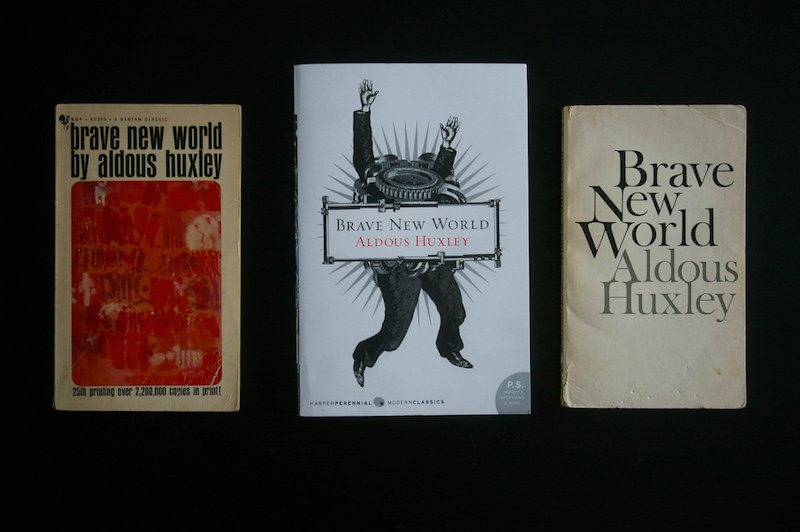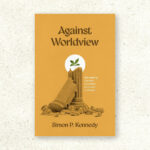Still lauded as an especially timely word to our age, it may come as a surprise to learn that Aldous Huxley’s famous novel, Brave New World, turns 85 years old this year. As a work of futurological fiction, it has sparked much conversation about the values and ideologies explored within its imagined world.
This year’s anniversary affords us a welcome pretext to revisit Huxley’s classic and to reflect on its relevance to the contemporary world.
New World Order

Brave New World finds its narrative premise and its object of criticism in the ascendant Fordist ideology of Huxley’s day, projected into an unsettling dystopian future. Within Huxley’s World State, Henry Ford is revered as a semi-mythical messianic figure. He’s the basis of its dating system (the book’s events occur in the year 632 A.F.—After Ford), and his name—that of the founder of the new world—is now employed where God’s name was formerly used. Mass production and mass consumption of disposable products (“ending is better than mending”), as well as the values of predictability and uniformity, are fundamental principles of the world order.
Human beings themselves have become the objects of the World State’s hyper-Fordism. Within a vast eugenics project, people are mass produced through advanced reproductive technologies and conditioning to be docile and serviceable participants in society, fully invested in the production and consumption that constitute its heart. There are five different castes or models of humanity, each carefully designed and conditioned to serve a given social purpose. Individuality and the particularism of familial or monogamous love are resisted as obstructions to social homogeneity and conformity—“everyone belongs to everyone else.”
As children are molded through uniform production line processes, sexual reproduction, monogamy, and the notion of mothers and fathers have all come to be regarded with disgust. Citizens are encouraged to engage in sterile promiscuous sex, to make them complacent to their servitude and as a means of preventing particular attachments from arising. As Huxley remarks in his introduction, “As political and economic freedom diminishes, sexual freedom tends compensatingly to increase.” Individuality and privacy are treated with suspicion.
Infantilization of the population is government policy. The aging of the body and the maturing of the character and mind are arrested and prevented, maintaining the capacities and tastes of the World State’s citizens in a permanent adolescent state. A homogeneous mass entertainment culture promotes social cohesion and quiescence. Intense doses of sensation in the form of “feelies” (a sensually enhanced form of cinematic entertainment) and popular sports all encourage people to be the puerile playthings of their impulses and desires, incapable of delaying gratification, developing conviction, feeling deeply, or devoting wholly to any one cause. Minds saturated with sensation and pleasure—most notably through the wonder hallucinogenic drug “soma”—are inoculated against thought, reflection, and non-conformity.
[These] all encourage people to be the puerile playthings of their impulses and desires, incapable of delaying gratification, developing conviction, feeling deeply, or devoting wholly to any one cause. Minds saturated with sensation and pleasure . . . are inoculated against thought, reflection, and non-conformity.
Brave New World’s title is an ironic allusion to a line in Shakespeare’s The Tempest. Despite its apparent pleasantness, the technocratic and pleasure-sodden society of the World State asphyxiates all of the passions, morality, meanings, ideals, and values of character elevated in the writing of Shakespeare. Easy sex stifles romance. Conditioning and pharmaceutically secured “virtue” substitute for self-denial and character formation. Unrelenting comfort, pleasure, and the absence of struggle make nobility and heroism unnecessary. Poetry, sacrifice, meaning, and God himself have no place in such a world.
Unimaginable Reality
Reading Brave New World can be a peculiar experience, as one is alternatively struck by amusingly quaint and alarmingly timely elements. Although the work has aged surprisingly well for futurological fiction, it’s nonetheless a product of its age. Despite Huxley’s prescience and perceptiveness, his vision was largely a projection from and escalation of the emerging dynamics of his age of mass production, mass consumption, and mass society.
Reading Brave New World can be a peculiar experience, as one is alternatively struck by amusingly quaint and alarmingly timely elements.
These dynamics have been superseded, or at least greatly complicated, by many subsequent developments. In a post-Fordist economy and a digital age of personalized devices, mass society is no longer as straightforward as it once seemed. Far from being perceived as a threat, for instance, individuality is now deeply assimilated into our economic system, as we’re encouraged to differentiate, identify, and align ourselves through our chosen forms of consumption. The fact we’re all caught up in the same system is less obvious when we all wear bespoke chains we’ve chosen for ourselves.
In fact, from our contemporary vantage point, a number of elements of Huxley’s vision seem far too conservative. Writing before the advent of modern genetics, Huxley couldn’t easily have imagined the direct genetic engineering of human beings now on our horizon and the degree of mastery over human nature this offers. Nor does he seem to have anticipated the form of sexuality in our age—the promiscuous sex in Brave New World is all heterosexual. Further, despite existing within a World State, the England providing the backdrop to Huxley’s narrative seems surprisingly provincial at points: Radical globalization had seemingly had limited effect.
From our contemporary vantage point, a number of elements of Huxley’s vision seem far too conservative.
One striking detail of Huxley’s portrayal is that, while the World State is founded on mass production, the process of automation is suppressed, with humans doing jobs that could easily be given to machines or algorithms (Huxley doesn’t explore the possibility of quasi-intelligent machines). From a contemporary vantage point it may require a significant suspension of disbelief to imagine such an economy might be tamed to serve a larger social end, even a dystopian one. Huxley may have feared a Fordist ideology concocted and imposed by “World Controllers” within a command economy—not an unrealistic fear in the age of rising Communism and Fascism; we now seem to have much more reason to fear our subjection to the autonomous and insatiable logic of a runaway capitalist system beyond human design or control.
The World State is an intensively planned society, one that can be directly presented in propositions and is integrated by a unified human vision. Much of Brave New World consists of expositional dialogue, within which the human ideology undergirding the World State is explicitly articulated. However, the social developments that most powerfully shape our world no longer seem to be planned and definitely don’t present themselves to us directly. Rather, they’re more typically technological and societal dynamics we set in motion, whose long-term destination is unclear and whose incremental effects on us, though vast in the aggregate and in retrospect, are only perceived obliquely in the moment and the particular—when they’re perceived at all. Though we may be unwittingly conditioned, the conditioner is more likely a technology such as the internet than a human intelligence.
Dominated by Desire

In the contemporary age, we have more to fear from uncontrollable and inexorable inhuman processes we’ve set in motion, which unfold themselves in society with a demoralizing inevitability. Our world is at the mercy of the twin forces of totalizing capitalism and advancing technology. While the latter extends the scope of what is possible, the former pushes to increase levels of consumption and our unconstrained capacity and urge to do so, overwhelming all obstacles that might curtail them. While human beings are the foot soldiers of these forces, the driving logic of the forces themselves towers over them.
This is a key point where Brave New World’s vision resonates. Huxley perceived, better than most, the degrading bondage into which we can be brought by our desire for pleasure. Neil Postman famously contrasted Huxley’s work with Orwell’s 1984, observing Huxley’s recognition that we may be more readily destroyed and dominated through our desires than our fears. Anesthetized by pleasures, entertainments, trivialities, distractions, lusts, and sensuality, we can be inured to the steady erosion of our humanity.
Huxley perceived, better than most, the degrading bondage into which we can be brought by our desire for pleasure. . . . We may be more readily destroyed and dominated through our desires than our fears.
In the contemporary world, as Slavoj Žižek has observed, we are subject to a soft totalitarianism that continually charges us to “enjoy!” The market has surrounded us with products and advertising that have been weaponized to excite and mobilize our desire to consume and to break down any resistance we might put up against it. In our oversaturated hyper-real world, we’re exposed to a host of artificially created stimuli that far exceed anything we would’ve previously encountered naturally—from chemically engineered foods, to the dazzling graphics of computer games, to mind-altering drugs, to the vibrant images on our screens, to online pornography, to the carefully manicured tourist destination, to the airbrushed model on the magazine cover, to the sociality of a site like Facebook. All these things are calculated to excite our hunger, overcome our resistance, and drive us to indulge. Capitalism’s wave of intoxicating pleasures overwhelms all obstacles before it—censorship, legal restriction, cultural taboo, social norm, religious virtue, self-control.
Edmund Burke argued that controls and restraints on human appetites are essential to human freedom, and one of our fundamental rights. Without such controls we can be reduced to infantile prisoners of pleasure, incapable of governing ourselves. A tragic example is the immense damage being caused by pornography, its power to overcome people increased by new technologies and the force of the market, making it both more enticing to consume and more difficult to oppose. And while a society fixated on popular mass entertainment and sports was on the rise in Huxley’s day, the scale of our own societal obsession with these things—and our relatively unquestioning consumption of pop culture as Christians—is arguably without precedent and is worthy of genuine alarm.
Dehumanized Subjects
Huxley further recognized the danger of human nature being subjected to the logic of production. Perhaps the most central reality of the World State is the replacement of sexual procreation by technical production: Humans cease to be begotten and start to be made. Huxley astutely perceives just how crucial this shift is and draws our attention to its various aspects in great detail: a culture of purely contraceptive sex and relative gender neutrality, the formation of children through conveyor belt-like processes, the elimination of the family and the bonds of love into which children are naturally welcomed, and so on.
Perhaps the most central reality of the World State is the replacement of sexual procreation by technical production: Humans cease to be begotten and start to be made.
Again, this aspect of Huxley’s work finds troubling resonance within our contemporary world. Through such things as the ideology of abortion, advances in reproductive technology, and the normalization of gender-neutral marriage, children are increasingly rendered subject to the logic of choice and construction. Human dignity itself rests in no small measure on the fact that we are not made but begotten—conceived through a loving gift of bodies that precedes and exceeds political, legal, economic, and technological realms of human activity. A culture that resists or neglects this truth, as ours is prone to do, risks changing its very understanding and treatment of humanity itself.
Human dignity itself rests in no small measure on the fact that we are not made but begotten. . . . A culture that resists or neglects this truth, as ours is prone to do, risks changing its very understanding and treatment of humanity itself.
Fighting for Freedom
As Christians in the 21st century, we’re facing a growing and profoundly daunting struggle for human nature and dignity. We must fight against the subjugation of humanity to the tyranny of pleasure, against the amniotic sensuality in which our culture would cocoon us, dulling us to any reality that might elevate our nature by calling us forth in duty, love, or worship. We must resist the allure of technical mastery over our nature—a mastery that risks our dehumanization. And in order to do these things, we must recognize and overcome the treachery that exists in each of our hearts, which would overthrow us from within. Facing these accelerating developments, Huxley’s Brave New World has never been so contemporary, nor the warning it sounds so urgent.
Against these things we must reassert the importance of moral self-mastery, of the relation between man and woman and the bestowal of life that can be occasioned by their love, of moral boundaries restricting the reach of the market and development of technology, and of the Lord and Giver of life to whom we are all beholden. If we fail to do so, we risk subjection to a bondage more insidious than any the world has seen.
Download your free Christmas playlist by TGC editor Brett McCracken!
 It’s that time of year, when the world falls in love—with Christmas music! If you’re ready to immerse yourself in the sounds of the season, we’ve got a brand-new playlist for you. The Gospel Coalition’s free 2025 Christmas playlist is full of joyful, festive, and nostalgic songs to help you celebrate the sweetness of this sacred season.
It’s that time of year, when the world falls in love—with Christmas music! If you’re ready to immerse yourself in the sounds of the season, we’ve got a brand-new playlist for you. The Gospel Coalition’s free 2025 Christmas playlist is full of joyful, festive, and nostalgic songs to help you celebrate the sweetness of this sacred season.
The 75 songs on this playlist are all recordings from at least 20 years ago—most of them from further back in the 1950s and 1960s. Each song has been thoughtfully selected by TGC Arts & Culture Editor Brett McCracken to cultivate a fun but meaningful mix of vintage Christmas vibes.
To start listening to this free resource, simply click below to receive your link to the private playlist on Spotify or Apple Music.


































